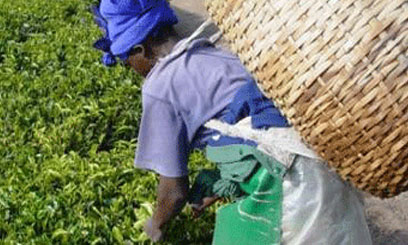 NAIROBI, Kenya, Dec 16 – The tea industry hopes to replicate its success in 2010 with foreign exchange earnings expected to hit the Sh100 billion mark this year, buoyed largely by a weak shilling and high international demand.
NAIROBI, Kenya, Dec 16 – The tea industry hopes to replicate its success in 2010 with foreign exchange earnings expected to hit the Sh100 billion mark this year, buoyed largely by a weak shilling and high international demand.
Tea Board of Kenya Managing Director Sicily Kariuki told Capital Business that although the overall output is projected to fall by 40 million kilograms compared to the volumes posted last year, the sector expects reprieve from a weak currency which at one point hit an all time low of Sh107 to the dollar.
“The statistics already show that as at the end of October (2011), we stood at Sh97 billion. If you look at (earnings in) November and December, clearly we are headed for another record year,” the MD said.
Last year was touted as the best year in the industry with export revenues hitting Sh97 billion, driven by improved purchasing power and increased demand for the beverage in emerging markets such as China, Iran and Turkey.
The local industry also fetched Sh6 billion bringing the total earnings from the sector to Sh103 billion.
Good weather conditions also contributed to the improved production which was also at an all time high at 399 million kgs.
However, 2011 has experienced erratic weather characterised by a dry weather spell early in the year and heavy downpour in the last quarter.
Although leaf production improved significantly in the last quarter, most of it went to waste because there was limited capacity to process it.
The volatile exchange rate presented mixed blessings for the sector because while it pushed up the earnings, the flip side was that the farmers had to pay more for the purchase of their imported farm inputs.
“The industry spends quite a lot of money importing inputs such as fertilisers, fuel and packaging materials so a little bit of what would have been seen as a total benefit has been impacted because part of the bill is used to offset the importation,” she explained.
She further conceded that the sector could achieve more growth if it effectively addressed the myriad of challenges facing it such as high labour costs and availability, rising energy costs and also if it managed to capture other new markets for its products.
To counter these constraints, the sector has been implementing various initiatives that would see it reduce its operation costs.
These include the use of mini-hydros as an alternative means of power that can lower the astronomical energy costs choking many industries. In addition, Kariuki said they are aggressively diversifying into other markets in a bid to spread their risks.
This is particularly because 75 percent of the country’s total volume is exported to five traditional markets; namely Egypt, Pakistan, United Kingdom, Afghanistan and Sudan thus exposing the industry’s ‘soft belly’.
The political upheavals that have been experienced in Egypt for instance, which is the largest destination for Kenyan tea, meant that her market there was affected.
The industry’s vulnerability is also seen in the current diplomatic stand off between Kenya and Sudan where the latter’s President Omar Al Bashir has threatened to impose sanctions including blocking Kenya’s products into his country.
Kariuki admitted that should Al Bashir make good his threat, the sector would suffer greatly. This is because Sudan, the fourth largest market for Kenyan tea, consumes about 20 million kilos worth about Sh5 billion.
While she reiterated their commitment to continue marketing the local produce in both the traditional and emerging markets, the MD hoped that dialogue in the Kenya Sudan case would prevail so that the country’s economic interests are not hurt.

































